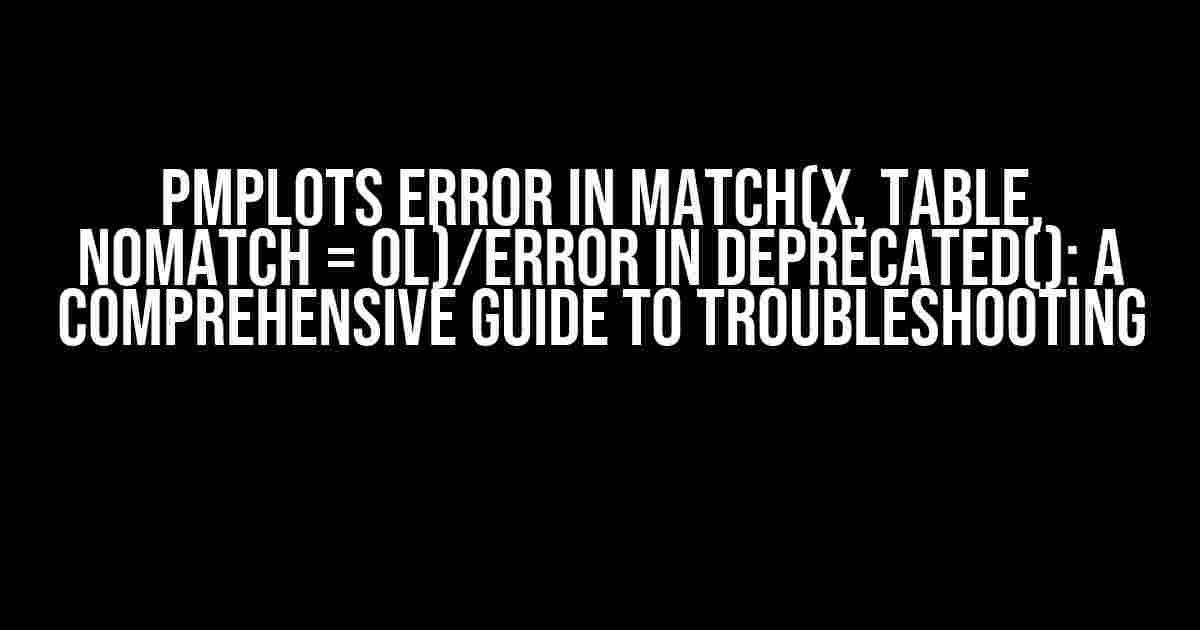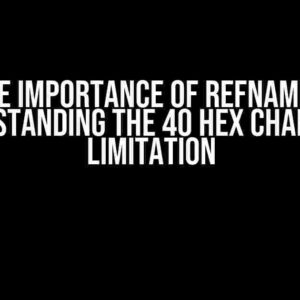Are you tired of encountering the frustrating pmplots error in match(x, table, nomatch = 0L) or error in deprecated() when working with R? You’re not alone! Many R users have stumbled upon this issue, but don’t worry, we’ve got you covered. In this article, we’ll delve into the world of pmplots and provide you with a step-by-step guide on how to troubleshoot and resolve these errors.
What is pmplots?
pmplots is a popular R package used for creating high-quality plots and visualizations. It’s an extension of the ggplot2 package and provides additional features for customization and flexibility. pmplots is widely used in data analysis, scientific research, and education.
Common Causes of pmplots Error in match(x, table, nomatch = 0L)
Before we dive into the solutions, let’s explore the common causes of this error:
- Typo in the code: A simple mistake in the code can lead to this error.
- Incompatible package versions: When pmplots and its dependencies are not compatible, errors occur.
- Data type mismatch: When the data type of the variables doesn’t match, the error appears.
- Missing or incorrect arguments: Forgetting to pass necessary arguments or passing them incorrectly can trigger the error.
Troubleshooting pmplots Error in match(x, table, nomatch = 0L)
Now that we’ve identified the common causes, let’s get started with the troubleshooting process:
Step 1: Check for Typos and Syntax Errors
Review your code for any typos or syntax errors. Make sure you’ve correctly typed the function names, arguments, and variable names. Pay attention to case sensitivity and punctuation.
# Example code with typo
pmplot(x, table, nomatch = 0L)
# Corrected code
pmplots(x, table, nomatch = 0L)
Step 2: Update pmplots and Dependencies
Ensure you’re running the latest versions of pmplots and its dependencies. Update your packages using the following code:
# Update pmplots
install.packages("pmplots")
# Update dependencies
install.packages("ggplot2")
install.packages("scales")
Step 3: Verify Data Type Compatibility
Make sure the data types of your variables match. Check the class of your variables using the class() function:
# Check data type of x
class(x)
# Check data type of table
class(table)
If the data types don’t match, convert them accordingly using the as. functions:
# Convert x to numeric
x <- as.numeric(x)
# Convert table to data frame
table <- as.data.frame(table)
Step 4: Provide Correct Arguments
Double-check that you've passed the correct arguments to the pmplots() function. Refer to the pmplots documentation for the correct syntax:
# Correct syntax
pmplots(x, table, nomatch = 0L)
Error in deprecated(): What Does it Mean?
The error in deprecated() is often accompanied by the pmplots error in match(x, table, nomatch = 0L). This error occurs when a function or argument is no longer supported or has been replaced by a new version.
What to Do?
When you encounter the error in deprecated(), follow these steps:
- Check the pmplots documentation for deprecated functions or arguments.
- Update your code to use the new functions or arguments.
- Consult online resources, such as GitHub issues or Stack Overflow, for solutions.
Common pmplots Error in match(x, table, nomatch = 0L) Scenarios
In this section, we'll address common scenarios that may lead to the pmplots error in match(x, table, nomatch = 0L):
Scenario 1: Mismatched Data Types
Suppose you have a numeric vector x and a data frame table, but you're trying to match them as if they were both character vectors:
x <- c(1, 2, 3)
table <- data.frame(A = c("a", "b", "c"))
pmplots(x, table, nomatch = 0L)
Solution: Convert x to a character vector:
x <- as.character(x)
pmplots(x, table, nomatch = 0L)
Scenario 2: Incompatible Package Versions
Suppose you're running an older version of pmplots (e.g., 0.5.0) and trying to use a feature introduced in a newer version (e.g., 0.6.0):
library(pmplots)
pmplots_version <- packageVersion("pmplots")
print(pmplots_version)
# pmplots version 0.5.0
pmplots(x, table, nomatch = 0L)
Solution: Update pmplots to the latest version:
install.packages("pmplots")
library(pmplots)
pmplots_version <- packageVersion("pmplots")
print(pmplots_version)
# pmplots version 0.6.0
pmplots(x, table, nomatch = 0L)
Conclusion
Troubleshooting the pmplots error in match(x, table, nomatch = 0L) or error in deprecated() requires a systematic approach. By following the steps outlined in this article, you'll be well on your way to resolving these issues and creating stunning visualizations with pmplots.
Additional Resources
For further assistance, refer to the following resources:
- pmplots documentation: https://cran.r-project.org/web/packages/pmplots/pmplots.pdf
- R documentation: https://www.rdocumentation.org/packages_utils/
- Stack Overflow: https://stackoverflow.com/questions/tagged/r+pmplots
Final Tips
Remember to:
- Regularly update your packages and R environment.
- Consult online resources and documentation.
- Test your code incrementally to identify errors.
- Practice patience and persistence when troubleshooting.
By following these guidelines, you'll become proficient in troubleshooting pmplots errors and be well on your way to creating stunning visualizations.
| Error | Cause | Solution |
|---|---|---|
| pmplots error in match(x, table, nomatch = 0L) | Typos, incompatible package versions, data type mismatch, or incorrect arguments | Check code for typos, update packages, verify data types, and provide correct arguments |
| Error in deprecated() | Using deprecated functions or arguments | Check documentation for deprecated functions, update code to use new functions or arguments |
We hope this comprehensive guide has helped you troubleshoot and resolve the pmplots error in match(x, table, nomatch = 0L) and error in deprecated(). Happy plotting!
Frequently Asked Question
Get ready to tackle those pesky pmplots errors with our expert Q&A session!
What's causing the "Error in match(x, table, nomatch = 0L)" in pmplots?
This error usually occurs when there's a mismatch between the data types or lengths of the x and table variables. Double-check that they're compatible and try converting them to the same data type if necessary. Additionally, ensure that the nomatch argument is set correctly, as it specifies what value to return when there's no match.
How do I fix the "Error in deprecated()" warning in pmplots?
Don't worry, it's not the end of the world! This warning typically appears when you're using an outdated function or argument that's been deprecated in a newer version of pmplots. Update your package to the latest version, and then check the documentation to see if the function or argument has been replaced with a new one. Make the necessary adjustments to your code, and you should be good to go!
Can I ignore the "Error in match(x, table, nomatch = 0L)" warning and still get my plot?
Technically, yes, you can ignore the warning, but it's not recommended. The error is telling you that there's a problem with your data or code, and ignoring it might lead to incorrect or incomplete plots. Take the time to investigate and fix the issue, as it'll save you headaches down the line.
How do I prevent "Error in match(x, table, nomatch = 0L)" from happening in the future?
To avoid this error, make sure to carefully review your data and code before running pmplots. Verify that your x and table variables are compatible, and use the correct data types and lengths. Additionally, stay up-to-date with the latest version of pmplots and R to ensure you're using the most recent functions and arguments.
What resources can I use to learn more about pmplots and error troubleshooting?
For pmplots-specific guidance, check out the official documentation and vignettes. For general R and error troubleshooting, resources like Stack Overflow, the R documentation, and online forums are great places to start. You can also try searching for tutorials and blog posts on pmplots and R plotting in general.


